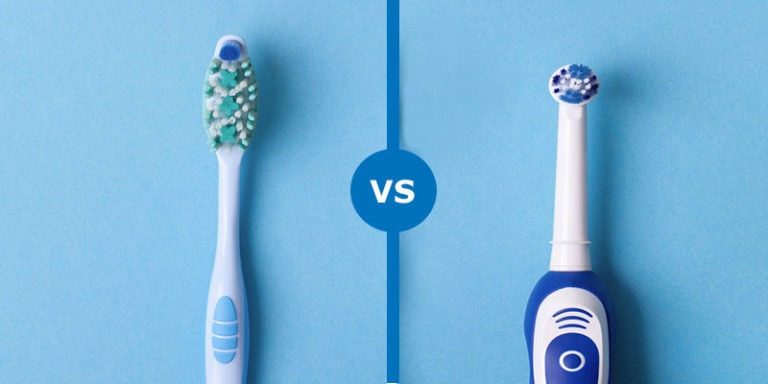Are electric toothbrushes better than manual toothbrushes?
Ensuring that you brush your teeth for two minutes twice a day is one of the most effective ways to take care of your teeth and gums at home.
The two main types of toothbrushes available are manual or electric toothbrushes. Electric toothbrushes have a motor that allows the toothbrush head to rotate, oscillate or vibrate in order to help you to remove plaque and debris when you brush.
Will an electric toothbrush clean my teeth better than a manual toothbrush?
Most research shows that people clean their teeth better when they are using an electric toothbrush compared to a manual toothbrush. This is because the vibration movements of the electric toothbrush does most of the work to remove the plaque, hence it is very user-friendly.
Also, most electric toothbrushes have timers in them, hence people tend to brush for a longer period when using an electric toothbrush compared to a manual toothbrush, hence resulting in a better clean.
Does this mean I should switch over to an electric toothbrush?
A manual toothbrush is still very effective in cleaning your teeth if used with the correct technique and for a sufficient length of time. It is best to speak to your dentist about the type of brush you are using and whether you would benefit from switching to an electric toothbrush to improve your oral hygiene.
People who have arthritis or joint problems often find it much easier to clean with an electric toothbrush. Electric toothbrushes are also a great way to encourage children to brush properly for an adequate length of time.
Is there a type of electric toothbrush that works better?
There are two main types of electric toothbrushes: oscillating-rotating head and sonic power head. Oscillating-rotating electric toothbrushes generally have a round head and work by having the toothbrush head spin and pulse. Sonic toothbrushes tend to look more like a manual toothbrush head and work by vibrating.
The majority of research concludes that oscillating-rotating electric toothbrushes cleans better than sonic toothbrushes as well as has a higher level of reduction in gum inflammation.
Do the expensive electric toothbrushes clean better than the cheaper ones?
Not necessarily. There are many different electric toothbrushes on the market with a wide variety of prices. Often, the more expensive electric toothbrushes have more features, such as multiple motor modes, travel cases and even Bluetooth connectivity! However, the majority of the time, the technology to clean the actual teeth is the same.
Will an electric toothbrush damage my gums?
No – an electric toothbrush used properly should not damage your gums. In fact, in many cases, electric toothbrushes can be more safe for your gums than a manual toothbrush as some people tend to brush with too much pressure with a manual toothbrush. Some electric toothbrushes have a pressure sensor and will emit a light if you are pressing too hard. No matter what brush you use, always make sure you use a soft bristle brush to prevent gum damage.
How often should I replace my electric toothbrush head?
Just like a normal manual toothbrush, the electric toothbrush head needs to be replaced periodically in order to ensure the bristles will continue to clean your teeth effectively. It is recommended to change heads every 3-4 months, however you should change your toothbrush head sooner if the brushes appear frayed and worn. Some brush heads have a colour indicator that fades, indicating when you should be replacing your toothbrush head.







